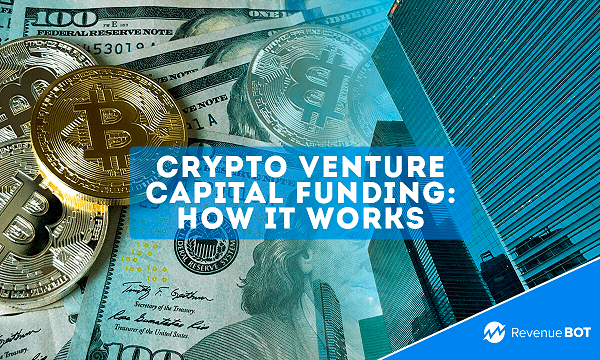
The world of finance and investing is experiencing shifts every single day. One of the most eye-opening aspects in this field has been crypto VC funding. This phenomenon merges cutting-edge blockchain technology and investment acitivities, offering new avenues for startups and investors alike.

Here we will delve deeper into venture capital investments and cover the pivotal aspects of this type of financing. We will explain what exactly it is and how it complements the crypto industry. Moreover, we will take a look at all the benefits and risks that both investors and startups might face.
What is venture capital funding?
VC financing is an important pillar of investment activity playing a major role in the growth of innovative projects and ‘upstarts’. It is also a financial strategy that fosters the growth of emerging companies by providing them not only with the necessary funds, but also with the expertise and advice given by experienced entrepreneurs.

Key features of VC funding:
- Higher risks. A fundamental feature of such financing is its elevated degree of risk. Those investing in startups and trailblazing projects realize that many of them may not break even or may even fail from the very start, and yet these people are willing to accept such a risk hoping for a greater yield off a fruitful investment.
- Long term outlook. VC funding often implies a long-term vision. Investors are likely to anticipate their returns and profits to come only after a few years, since startups take time to develop and reach profitability.
- Active involvement of investors. VC investors quite frequently provide startups not only with financial support, but also with their expertise. They can assume board seats, provide strategy and marketing advice, and help network startups with essential contacts.
Such kind of funding can be done both in traditional financial markets and through the use of crypto and blockchain-based technologies.
How VC funding works in crypto sector
VC funding has arrived in the crypto industry from traditional markets. Further on, we’ll break down how it all works in the crypto world.
- Investments through ICO
Among the most common ways to raise VC investment here are ICOs, or initial coin offerings. An ICO is basically a process where a startup issues its native cryptocurrency or token and sells it for fiat money. This enables the startup to generate funds for the project’s development, while investors obtain tokens that may have a potentially high value in the long run.
- Investments through smart contracts and automated VC funding
Blockchain technology empowers you to create smart contracts capable of automating VC investment processes. It is possible for investors to set the terms of smart contracts, such as dividend payouts or exit conditions, so that these terms work automatically when specified events occur. This eliminates the need for intermediaries and ensures greater transparency and credibility between the parties.
- Worldwide access and diversification
With crypto and blockchain, VCs have global accessibility to investments. Investors are free to participate in projects from all over the world regardless of their place of residence. On top of that, cryptocurrencies allow you to diversify your portfolio by contributing to different projects and tokens.
- Potential risks
There are additional risks including high volatility in the crypto market, as well as the chance of you being exposed to scams and fraudulent projects. What you should do is be cautious and perform thorough research before making an investment.
What are some examples of VC investments?
There are plenty of prosperous projects in the crypto industry which have attracted considerable investments and proved to be very lucrative for their investors.

Ethereum stands as one of the most prominent cryptocurrencies, but many people are unaware that it embarked on its journey as a startup by raising funds through ICOs. Back in 2014, Vitalik Buterin and his team raised over $18m dollars solely by offering ETH. As of today, Ethereum is a one of the leading cryptocurrencies and a smart contract platform that appeals to a great number of developers and projects of all kinds. By the time of the ICO, the token was worth roughly $0.31, so it’s quite easy to guess that those who opted to keep holding the coin and avoid selling it made a pretty decent profit.
Ripple is a blockchain platform featuring its native XRP token centered around providing lightning-fast and inexpensive cross-border payments. Ripple Labs won financial backing from VCs and other large financial institutions. XRP went on to gain traction as one of the most debated and widely used cryptocurrencies in the industry.
Binance happens to be a major crypto exchange which kicked off in 2017. Changpeng Zhao, the exchange’s founder, gathered investments just by issuing his very own token, Binance Coin (BNB), during an ICO. Soon Binance has grown to become by far one of the largest and hottest exchanges in the world, with a broad range of services and products for crypto traders.
Here is the Chainlink, a project focused on creating oracle networks (oracles) that enable the integration of real-world data from outside sources into smart contracts on the blockchain. The project succeeded in attracting investment and further evolved into an influential element in decentralized-applications- and smart-contracts sector.
Conclusion
If we are speaking about VC funding in the crypto industry, it opens up opportunities for new startups, offering them access to global resources and the chance to grow in an all-innovative environment. Likewise, it helps investors diversify their portfolios and enjoy higher yields.
Keep in mind, however, that this field also presents risks, including the volatility of cryptocurrencies and possible botched startups. Therefore, it is important to approach such kind of investments with caution and careful analysis.
